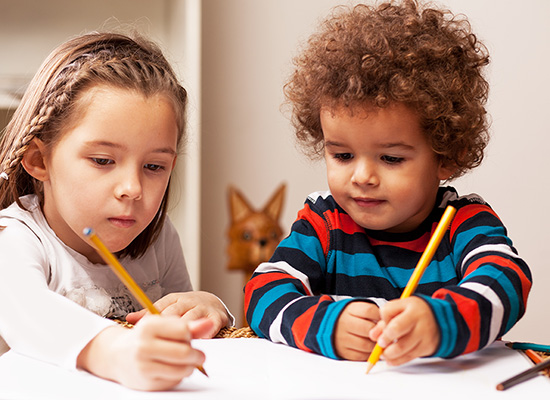Play therapy is a type of psychotherapy to help children with behavioral or emotional difficulties.
While playing, children communicate their thoughts and feelings naturally. As the child plays, the therapist notes certain themes and patterns that are important to the child. Over time, the therapist helps the child understand certain meanings in the play. This is important because the play reflects issues that are important to the child and relate to their difficulties.
Through play therapy, the therapist will help the child see the need to make changes. The child’s communication with parents can improve. Trust, impulse control, coping with frustrations and anger, low self-esteem, and ability to relate to others – all can improve through play therapy. Tantrums, nightmares, aggressive behavior, worries and fears can also improve with play therapy.
Play therapy is especially helpful for children who have been abused or neglected, or had another type of traumatic experience.

What happens during play therapy?
In play therapy, the psychologist meets with the parents first to collect a significant amount of background about the family and the child. Then, the child and therapist meet alone most of the time. Sessions with parents are arranged separately, as needed.
Children typically will deny having a problem, or may not realize they have a problem. During the first sessions, the therapist explains to the child why they were brought in for treatment. The child learns that they can say anything they want in the sessions.
During the sessions, the therapist will see the child “acting out” various themes that are important to the child. From this, the therapist guides the child until the problem has been resolved for a stable period of time.
At times, the therapist will take a child into a playroom with carefully selected toys. The toys help children express their feelings and problems. The therapist allows the child to select the toys and the ways that they want to play with them. The therapist pays very close attention to the child’s actions and feelings, and might get involved in imaginary play with the child.
In play therapy, the therapist might decide on a specific type of activity because the child will learn a new skill – or will better understand something.
At times, the entire may be involved in the play therapy.
The benefits of play therapy
Play therapy can be very helpful for traumatized children. Even teens and adults can benefit from treatments that involve play and art. When words fail us after an intensely frightening event, another means of expressing ourselves become necessary – to help the healing process.
When sessions need to end, the therapist will help the child work through the “closure” to avoid feelings of rejection. Play therapy can be critically important for children to work through difficult emotions – and move on to develop into an emotionally healthy adult.

